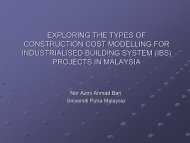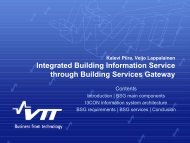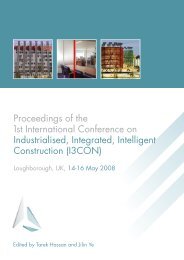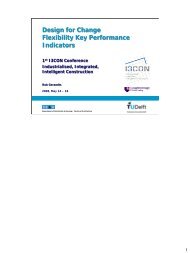Industrialised, Integrated, Intelligent sustainable Construction - I3con
Industrialised, Integrated, Intelligent sustainable Construction - I3con
Industrialised, Integrated, Intelligent sustainable Construction - I3con
Create successful ePaper yourself
Turn your PDF publications into a flip-book with our unique Google optimized e-Paper software.
HANDBOOK 2 SUSTAINABLE CONSTRUCTION<br />
Design & <strong>Construction</strong> Processes Track only started in 2009 in its current form (before 2009 the track<br />
also existed, but lacked focus). Hopefully, this track will get an equally enthusiastic student<br />
community in the coming years.<br />
Looking at the current curriculum of the two discussed MSc tracks, we can name a few subjects that<br />
deserve special attention:<br />
• Systems thinking: many students have problems with systems thinking. They find it abstract<br />
and they do not see its value; civil engineering students prefer to solve calculations. This is a<br />
persistent issue, which will probably never disappear.<br />
• Gaming and simulation: this is a new area that in our opinion has a lot of potential in the<br />
context of process innovation in construction. But we need to develop more expertise in gaming<br />
and simulation in order to be able to add more gaming and simulation elements to the<br />
curriculum.<br />
• Sustainability: this is a broad theme including concepts such as Life-Cycle Thinking, Cradle-to-<br />
Cradle Thinking, Energy Efficiency, CO2 emissions, minimalization of waste etc. Many of<br />
these concepts are already discussed in our MSc tracks and also in the BSc courses, but not<br />
really in depth. While the sustainability issues are on the top priority list of policy makers (see<br />
the EU activities in this field), we can observe that still few students choose sustainability<br />
subjects for their graduation work. Also few companies and organisations stimulate graduation<br />
work on sustainability issues by offering internships.<br />
From the above subjects, the subject of sustainability and all the associated concepts is probably the<br />
one that deserves most attention, for example when the current study programs need to be evaluated.<br />
However, regarding sustainability several barriers and limitations can be seen that make it difficult to<br />
make improvements. One limitation for civil engineering is that our faculty does not deal with indoor<br />
building spaces and therefore with heating and ventilation systems and other energy-consuming<br />
systems.<br />
Another issue related to sustainability is that in the area of total energy and waste impact, a lot of<br />
analysis work and development of awareness remains to be done. For example, few people have<br />
insight into the energy consumption and waste impact of construction, production and transport of<br />
building materials, etc. compared to the energy consumption and waste impact of building use. As<br />
soon as the mainstream of construction companies and organisations get to know this kind of<br />
information and feel the urge to make improvements, then major steps can be taken towards a<br />
<strong>sustainable</strong> construction industry.<br />
Conclusions<br />
This chapter discussed the way civil engineering students at Delft University of Technology are<br />
prepared for their role as future innovation leaders for <strong>sustainable</strong> construction. The work presented is<br />
motivated by the vision that the success of construction projects is mainly dependent on human and<br />
organizational aspects of construction projects, related to design processes, building modelling and<br />
project management.<br />
These ideas have been applied in a number of Design Project courses for the BSc stage of the civil<br />
engineering study, and in two dedicated MSc tracks: Design & <strong>Construction</strong> Processes and<br />
<strong>Construction</strong> Management & Engineering. Many important concepts for construction innovation are<br />
dealt with in these courses, such as value orientation, systems thinking, building information<br />
modelling and life cycle thinking.<br />
However, some of these concepts are not yet sufficiently dealt with, most notably building<br />
information modelling and current sustainability issues such as energy consumption and waste impact.<br />
These subjects could significantly benefit both from new knowledge out of research projects and from<br />
knowledge out of construction practice. Hopefully, in the near future the transition can be made from<br />
89






